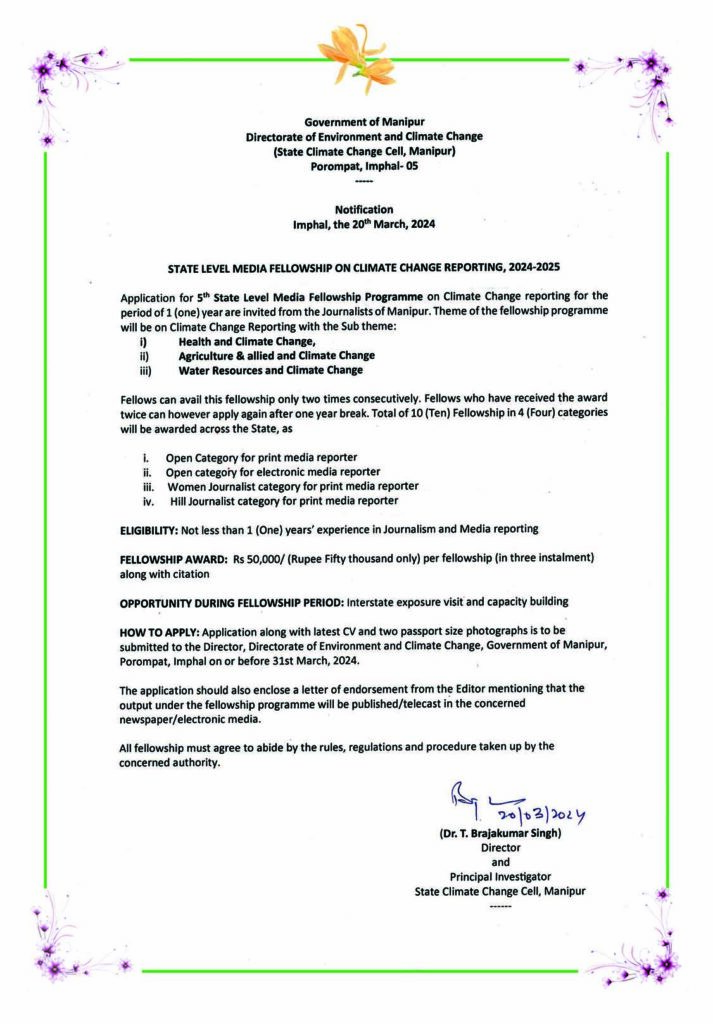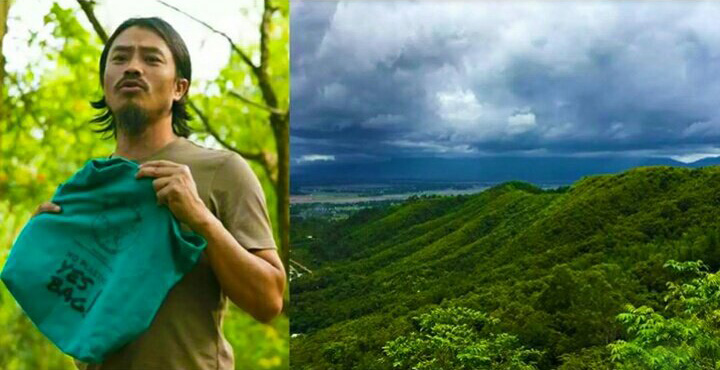The World Environment Day 2021 was celebrated online by the Environment Club of the DM College of Arts this weekend on June 5 on the theme ‘Ecosystem Restoration’. The club invited noted environmental activist and the founder of the WAHPS, Moirangthem Loiya for an interaction programme in which he spoke at length about his project at Punsilok at the Langol hills along with answering many questions under the guest topic of ‘Man’s relation with nature and Covid-19 pandemic’. Many interesting and also relevant questions were put forward by the host Mutum Tenisun Singh on behalf of the club, and later in the programme by Melody Huirem on behalf of the audience. Here we have a synopsis of the various queries and how the guest Moirangthem Loiya responded to them.
Tenisun: Those who have heard about your work at Punsilok find it very inspiring. Could you tell us how Punsilok began and about your call?
Loiya: I always love going outside and as a youth like going to nature. I enjoyed climbing trees with help of ladders. In 1984-85 I went to Koubru and was amazed by that land. When I came back from MCC Madras in 1999 we went there again and by then jhum cultivation had started there and the trees were dry all over. I was deeply affected. The MCC had a large campus and I deeply liked the forest area there. I realised we are all mother nature’s children and wanted to pay back my respects to nature by planting trees. Then I spotted Punsilok to fulfil that work.
Tenisun: There are varied attacks from heat, rising temperature, recent cyclone, and risk of Bangladesh getting inundated in the sea. Help us redefine this relationship between nature and man, especially during Covid.
Loiya: Water, earth and air will always have a relation with us. The body is a gift from nature and depends on what we eat from the earth’s produce. There’s a choice also. The body can be abused with drugs and alcohol. Birds, trees, space are our external body. We can say this relation has stopped due to ignorance. Health and well being depends on how clean the river water is. It’s not rocket science. There are things we have to preserve as inherent to our thawai. These pats, umangs, oceans, we can’t create them again. It’s on a cosmic scale like the sun, moon etc.
The Covid virus doesn’t affect bats in the caves, but it affects our delicate bodies. Vaccines are not the solution. We have to identify what’s part of the thawai and save that. We are all in one boat and if it capsizes, we all will drown.
Tenisun: You said we shouldn’t disturb the man-nature balance by preserving some things. What are the things we do that harm the environment?
Loiya: Some of the things we do not understand. Nature’s complex. When we see an ant it’s so complex, we can’t understand. There are things we don’t know about like the forests which we shouldn’t destroy, but respect. In Bhutan there’s large forest cover. I went in the winter’s and found there’s a good water level. The communities in northeast depend on nature. We get forest products and food from nature here and we should know where this water, soil, pats come from, and also stop harming them. In Sikkim the trees are worshiped and, in the Kanchenjunga, summitting is not allowed as they worship it. I feel in Manipur we are misguided though our land is also rich in nature. We have been unable to preserve.
Tenisun: Manipur is a bio-diversity hot spot but there are also many ecological losses. What can we do about it?
Loiya: The lower range of the Himalayan range, like in Manipur, mountains were formed little late. It’s between Burma and the lower parts so earthquakes are also a danger here. But the soil is good for growing. However, the tribes and the valley are economically poor and survive on livestock and small farms. When the people here see people from outside, they have aspirations to improve the lot of their children and they start exploring for ways to get money. So, they see a big tree as a source of money. The bio-diversity degradation is due to economic backwardness compounded by the attempt to imitate the outside world in exploiting animals, trees etc.
Tenisun: Research shows that a 20-year-old tree is worth Rs. 15,000 as wood, but its support to the environment in the same time is worth Rs. 15 lakhs. What can the government or CSOs do to tell this to the people?
Loiya: Humans only copy something good but at the moment awareness is missing. It’s the youth and children are more aware. You have to be in love with nature. I romanced with Punsilok. The beauty of the water, going for camping, going to Sikkim, Bhutan, Kaziranga. The youth and children have to be told to make them feel. Awareness has started but a direct feeling has to be generated in the people.
Tenisun: What is the environmental impact of building dams like Ithai barrage or infrastructure development that thinks only of skyscrapers and mega dams?
Loiya: Like any organism on the planet, man has also survived through billions of years. Development is not only by imitating what the west does. You see some water and think you have to build a dam imitating development in the west. There are bad and good projects and it’s a difference of opinion. The government now is a business model. The leaders have all come from industrial states. Now they are looking for land connection as India has sea on the sides. Though roads have to be built northeast has to have good judgment. We have to connect with informed people and know the projects.
Tenisun: Environment assessment reports need long term assessment, not a few months. And what about infrastructure projects?
Loiya: Projects like the small ones at Loktak are all locally implemented. There’s the question of corruption also and it’s our own people, our officers who are looting. They are all personally known to us.
Tenisun: We forget the environment 364 days in a year. Will this save the environment?
Loiya: Global warming is real. People in low lying places of Bangladesh will soon migrate to this region. And people will be forced to share this land. Those who don’t do anything for the environment, this day is a reminder. It’s very positive. But one should not forget the positive work done on this day. We have to look after the trees for 4-5 years after planting them. Plant the trees with love for it in the heart, and also weed it, prune it and look after it.
Tenisun: What activities can the youth and other people do in relation with this day?
Loiya: What I would tell the government, powerful people and all stakeholders is it’s not going to become like New York, Mumbai. The rivers, weather, hills, altitude, vegetation and wildlife are given by nature. Villages at different altitudes can grow different things. We can assess information from scientists and build schools, orchards and tell them this is your water source. It’s happening in Meghalaya and they have tourist spots also. Tangkhul, Kuki, Meitei cuisine culture can be displayed and people will be attracted. A Meghalaya village is the cleanest village in Asia now beating the record of a Japan village.
Ethical camping, homestays, natural resources, economy, roads, schools and infrastructure can be built and I would like to take this opportunity to ask the state’s leaders to consider these things.
We shouldn’t get demotivated by the present situation. If we think only about ourselves, we can’t accomplish anything, but if we do something for others like Irabot or Tikendrajit we can live unselfish lives. We are educated now in Manipur and should make Manipur what I have named the ‘land of 1000 streams’.
Questions from the audience selected by Melody Huirem
Melody: Does the Punsilok have tortoises?
Loiya: In Manipur thengus are in the pats. It’s not possible to keep them at Punsilok. It will be a waste of effort.
Melody: What role can the youth have in saving the environment?
Loiya: This webinar itself is an example. Come to Punsilok and we can meet and do so many things for schools, colleges. The DM Club can also inspire children.
Melody: How can we minimise the destruction of hills in Manipur?
Loiya: When the situation is stable the government can do so many things. About their living standards and stopping degradation of the environment.
Melody: What are your future plans and goals?
Loiya: I fixed a 35-year goal for Punsilok. Now 15 years have passed. After that the trees will speak for themselves and they won’t be cut. When our organisation is structured there’s possibility of doing projects at other places also. When we do everyone will know.
Melody: Is deforestation caused by over-population?
Loiya: No. Population is not much in Manipur. It’s because of poverty. Survival is a basic need, but if they exploit the environment for immediate survival, they will be suffering even more. Like there’s demand for furniture from Imphal and when people don’t have money, they will cut the trees. It’s unfortunate, they are the real sufferers.
Melody: Under the UNESCO what can be done by us in Manipur?
Loiya: We should know what we have and what we don’t. We have things like forests, environment. Punsilok was degraded but now it’s a restored, preserved and enhanced place. Orchids and large trees are no more. It takes 1000s of years to restore.
Melody: Please comment on Covid and nature.
Loiya: Earth’s default position is a natural, healthy state. In the past years it has been disrupted. It’s not just the pandemic. A species cannot override another species. I have been observing for long. The cities are market oriented, not health oriented. They are all destructive systems. Pandemic is just a signal. In future there will be less women giving births. After 1000s of years man will be regenerated in the ecosystem after being lost. It’s a matter of death, we should take it as a warning.
Melody: What aspects do you inspect for ascertaining environmental damage?
Loiya: Examples are dams, water research, study of history and assessment. Also, alien trees can’t be transplanted from the northern to the southern hemisphere. Manipur trees take more water. Pine and dry, arid trees can’t be planted here as there will be water loss.











1 thought on “Rapidly Transformed Punsilok Inspires DM College Environment Club to Celebrate World Environment Day 2021 with Renewed Interest”
A very well detailed report of the Session. Awesome work👍👍👍👍
Comments are closed.